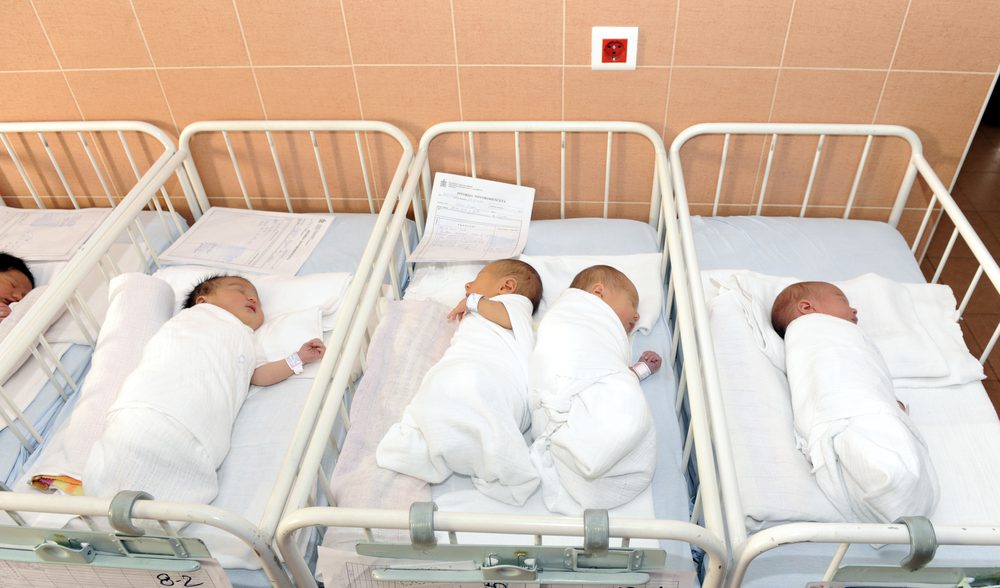The Coming Covid Baby Boom?

The world is filled with babies, or so it seems from my little corner of chockablock-concrete Washington, D.C. Here at TAC, we’ve had four people take parental leave over the past year, with another one about to depart. And while grumbling reactionaries like ourselves are rarely on the cutting edge of anything, I’d like to think that for once we’re ahead of the trend.
The much-anticipated Covid baby boom may finally be here.
Back in 2020, social scientists were abuzz about what they thought would be a summertime spike in pregnancies. The logic was simple enough: There was a pandemic on…there wasn’t much to do…your local downtown wasn’t safe, especially if it featured a statue that had been built more than 10 years ago… Yet not only did this boom not happen, it turned out to be a bust. According to a Brookings Institution analysis of CDC data released back in May, there were “nearly 40,000 ‘missing births’ in the final month and a half of 2020, which would have otherwise been conceived in the early months of the COVID-19 pandemic.”
Overall, the CDC found that the provisional number of American births in the year 2020 was actually down 4 percent from 2019. What happened? No one can be entirely sure but the most likely culprit was uncertainty, both about the economy and the pandemic itself, which made people think twice before trying to have kids. I can attest to this personally. As a new father, it was harrowing to be at a hospital when all the staff were militantly masked up, when everyone seemed to have a grim story about how bad things had recently been.
Yet the fact remains that, whatever Muriel Bowser might think, the quarantine is now over. And while Covid-19 cases are tracking upwards again, most states are still open for business. It’s with this in mind that a new study from Michigan Medicine says there’s still going to be a Covid baby boom; it’s just been delayed. “Birth rates declined early on in the pandemic, but we expect a dramatic rebound soon,” says head researcher Dr. Molly Stout.
Stout and her colleagues have used their medical system’s electronic health records to accurately predict pandemic-era birth rate trends, including last year’s collapse. Now, they’re advising their hospital to plan for a 10 to 15 percent increase in births over what would typically be expected during the summer and fall of 2021. And while one might object that this surge could be unique to their facility, Stout says she has no reason to think it is, that the same trend should be seen nationally.
Baby booms, originating as they do in a multitude of factors and decisions, can be difficult to predict. The Swedish baby boom of the late 1980s, to take one example, is still something of a mystery, coming as it did amid declining birth rates across the rest of Europe and followed as it was by a baby bust (though some now credit the introduction in Sweden of certain parental leave benefits). Yet most baby booms and busts can be explained at least in part by economic and social circumstances. Everyone knows America’s midcentury baby boom was sparked by the return of the G.I.s from World War II and the end of the Great Depression.
So it makes sense that the conclusion of a pandemic would correspond with an increase in children. But then that also means a 2021 baby boom could yet be impacted and even arrested by other events too. More lockdowns, social chaos, inflation—all could make couples think twice before trying to conceive. And it’s very much in our interest to hope that doesn’t happen. Because the birth rate last year didn’t just fall; it plunged to its lowest point since the United States started keeping record. A little over a decade ago, the average American woman was having 2.1 children, down significantly from the 1950s but still at least at replacement rate. In 2020, it was only 1.6 children.
That lack of births is now having serious cultural and political implications. In one of the great ironies of our time, the Trump presidency has served to usher family values back into the GOP with the rise of a new generation of right-leaning populists willing to use public policy to avail moms and dads. The most prominent of these is J.D. Vance, author of Hillbilly Elegy, who is running for Senate in Ohio. Vance has blamed America’s decline on the “childless left” he says doesn’t have a stake in the future of the country. He’s ridiculed liberals like Paul Krugman as “cat ladies” because they don’t have any kids.
It is there that I must quibble slightly with Vance. I’ve known a couple kind old cat ladies in my day; they deserve better than to be compared to Paul Krugman. As Vance has admitted, there are plenty of deeply sympathetic reasons why women don’t have kids, can’t have kids, never marry, must divorce. Life is various and unexpected, worth remembering as we take something as vibrant as childbirth and run it through the wringer of the culture war.
Yet what must also be said is that families are good, they ought to be supported, and their decline is indicative of deeper problems. Much has been made about this wet hot American summer, when we’re supposedly going to cast off our Covid chains and finally be with each other again. We should hope that’s true in more than just the Platonic sense. If a baby boom is in fact upon us, may it amount to more than just a correction over the previous year.
Comments